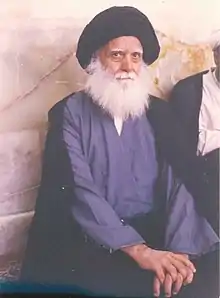Sadrist Movement
The Sadrist Movement (Arabic: التيار الصدري al-Tayyār al-Sadri) is an Iraqi Islamic national movement led by Muqtada al-Sadr. The movement draws wide support from across Iraqi society and especially from the Shi'a poor in the country. The most important person in setting the goals and the philosophy of the movement was Grand Ayatollah Mohammad Mohammad Sadeq al-Sadr. A prominent preceding influence had also been Muhammad Baqir al-Sadr. The movement is religious and populist. Its goal is a society ordered by a combination of religious laws and tribal customs.
Sadrist Movement التيار الصدري al-Tayyār al-Sadri | |
|---|---|
 | |
| Leader | Muqtada al-Sadr Abu Azrael |
| Founded | 2003 |
| Headquarters | Sadr City, Baghdad |
| Ideology | Shi'a Islamism Religious conservatism[1] Iraqi nationalism Populism Anti-imperialism |
| Political position | Right-wing |
| Religion | Shi'a Islam |
| National affiliation | Alliance Towards Reforms (Saairun) |
| Seats in the Council of Representatives of Iraq: | 34 / 328 |
| Seats in the local governorate councils: | 43 / 440 |
| Website | |
| http://www.jawabna.com/ | |
2009 governorate elections

During the 2009 Iraqi governorate elections Sadrists ran under the name Independent Free Movement.
Results
The list received 9.8% of the vote and 43 out of 440 seats, coming third overall to the State of Law Coalition and the Islamic Supreme Council of Iraq.[2][3][4]
| Governorate | Percentage | Seats won | Total seats |
|---|---|---|---|
| Anbar | - | 0 | 29 |
| Babil | 6.2% | 3 | 30 |
| Baghdad | 9% | 5 | 57 |
| Basra | 5% | 3 | 35 |
| Dhi Qar | 14.1% | 7 | 31 |
| Diyala | 3.1% | 0 | 29 |
| Karbala | 6.8% | 4 | 27 |
| Maysan | 14.6% | 7 | 27 |
| Muthanna | 5.5% | 2 | 26 |
| Najaf | 12.2% | 6 | 28 |
| Nineveh | - | 0 | 37 |
| Qadisiyyah | 6.7% | 3 | 28 |
| Saladin | - | 0 | 28 |
| Wasit | 6.0% | 3 | 28 |
| Total: | 9.8% | 43 | 440 |
2010 parliamentary election
During the 2010 Iraqi parliamentary election Sadrists were part of the National Iraqi Alliance.
In a press conference on 6 March 2010 ahead of the 2010 Iraqi parliamentary election, Muqtada al-Sadr called on all Iraqis to participate in the election and support those who seek to expel U.S. troops out of the country. Al-Sadr warned that any interference by the United States will be unacceptable. Al-Sadr, who has thousands of staunch followers across Iraq has consistently opposed the presence of foreign forces and repeatedly called for an immediate end to the occupation of Iraq.[5][6]
Splinter factions
Over time, numerous factions in the Sadrist Movement disagreed with Muqtada al-Sadr over various issues and broke off, forming separate militias and parties:
Involvement in the Syrian Civil War
In October 2012, various Iraqi religious sects join the conflict in Syria on both sides. Shiites from Iraq, in Babil Governorate and Diyala Governorate, have traveled to Damascus from Tehran, or from the Shiite holy city of Najaf, Iraq, claiming to protect Sayyida Zeinab, an important Shiite shrine in Damascus.[9] According to Abu Mohamed, with the Sadrist Trend, said he recently received an invitation from the Sadrists' leadership to discuss the shrine in Damascus.[9] A senior Sadrist official and former member of Parliament, speaking said that convoys of buses from Najaf, under the cover story of pilgrims, were carrying weapons and fighters to Damascus.[9] Some of the pilgrims were members of Iran's elite Islamic Revolutionary Guards Corps.[9]
However, later in 2017 following the Khan Shaykhun chemical attack in Syria, Muqtada al-Sadr called for Syria's president Bashar al-Assad to step down from power.[10][11]
References
- "Iraqi Communists and Shia Sadrists unite to tackle corruption and sectarianism". Middle East Eye. 28 February 2018.
- "Final Provincial Election Results". Archived from the original on 12 October 2011. Retrieved 19 February 2015.
- Preliminary Results Governorate Elections Archived 2009-03-26 at the Wayback Machine
- Joel Wing. "MUSINGS ON IRAQ". Retrieved 19 February 2015.
- Iraqi Shia Leader Calls for US Withdrawal From Iraq
- Sadr urges Iraqi voters to pave way for US pull-out
- Aymenn Jawad Al-Tamimi (31 October 2017). "Hashd Brigade Numbers Index". Retrieved 4 August 2018.
- "Jaysh al-Mu'ammal". Jihad Intel. Retrieved 4 August 2018.
- GHAZI, YASIR & ARANGO, TIM (October 28, 2012). "Iraqi Sects Join Battle in Syria On Both Sides". New York Times. p. A1.
- https://www.reuters.com/article/us-mideast-crisis-iraq-syria-sadr-idUSKBN17B070
- https://www.newsweek.com/powerful-iraqi-shiite-cleric-moqtada-al-sadr-calls-assad-chemical-attack-581610